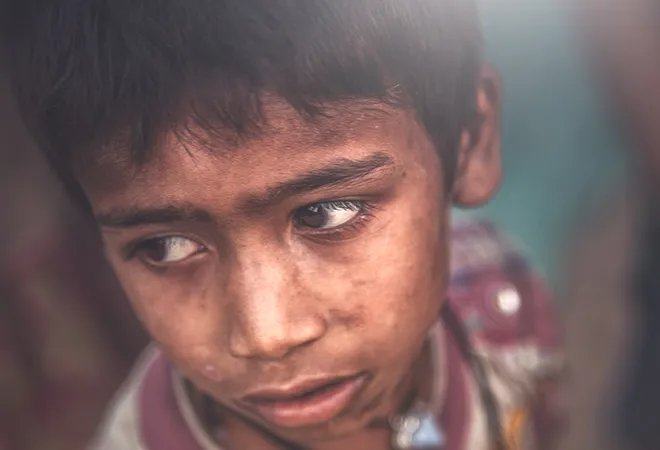-
CENTRES
Progammes & Centres
Location
As part of this year’s Poshan Maah, a plethora of activities have been initiated at the district levels to address malnutrition amongst women and children.

The first week of September is celebrated as National Nutrition Week to raise awareness of the importance of nutrition for good health, development, and economic growth. The concept of National Nutrition Week was first launched in 1973 by the American Dietetic Association to educate people on nutrition. In 1982, India launched the concept of National Nutrition Week to raise awareness about the importance of nutrition for a healthy and sustainable lifestyle. This was later followed by the National Nutrition Mission or the POSHAN Abhiyaan to reduce stunting in children under the age of five and low birth weight by 2 percent and anaemia by 3 percent annually to achieve the target of ‘malnutrition-free India’ by 2022. Since the start of POSHAN Abhiyaan, the month of September is observed as ‘Nutrition Month’ or ‘Poshan Maah’.
The infant and young child feeding practices show a decline in early initiation of breastfeeding (41.8 percent) and timely introduction of complementary feeding (45.9 percent), with 11.3 percent of the children receiving a minimum adequate diet.
According to the Global Hunger Index, India shows worsening trends, ranking 101 amongst 116 countries, and faces ‘serious’ levels of hunger. The latest National Family Health Survey (2019-21) shows unacceptably high levels of malnutrition amongst children below five years, with over 35.5 percent of children stunted, 19.3 percent wasted and 32.1 percent underweight. Anaemia is found to be alarmingly high amongst children under the age of five (67.1 percent) and women in the reproductive age group (57 percent). The infant and young child feeding practices show a decline in early initiation of breastfeeding (41.8 percent) and timely introduction of complementary feeding (45.9 percent), with 11.3 percent of the children receiving a minimum adequate diet.
The Global Burden of Disease study for India indicates that 68.2 percent of the total deaths in children below the age of five are due to malnutrition. Evidence indicates that childhood stunting has lasting effects on future generations and is associated with a loss in economic productivity. A micro-level study from India found birth interval, low birth weight, breastfeeding duration, mother’s age at conception and her education as risk factors for stunting in children under five.
India has accorded high priority to combating malnutrition with the launch of Integrated Child Development Services in 1975 and the Mid-Day Meal Programme (now PM POSHAN Scheme) in 1995. The National Nutrition Policy was also launched in 1993 to combat the problem of undernutrition through both direct and indirect interventions. Similarly, the National Food Security Act 2013, accorded food and nutritional security in human life, by ensuring access to adequate quantity of quality food at affordable prices to people Despite these measures, malnutrition continues to be a public health concern amongst children under five years of age.
A micro-level study from India found birth interval, low birth weight, breastfeeding duration, mother’s age at conception and her education as risk factors for stunting in children under five.
This year, the fifth h Rashtriya Poshan Maah aims to convert ‘Jan Andolan’ into ‘Jan Bhagidari’ to fulfil the vision of a ‘Suposhit Bharat’. Rashtriya Poshan Maah strives to generate awareness about nutrition and mobilise community participation to meet the challenge of malnutrition. The Ministry of Women and Child Development and the state departments carry out activities to spread awareness on holistic nutrition for a healthier lifestyle. It is celebrated each year along with theme-based activities; this year the focus is to activate ‘Poshan Panchayats’ involving the Sarpanch and the gram panchayats as the fulcrum of activities under the Jan Bhagidari. The activities planned include themes such as Mahila and Swasthya; Bacha and Shiksha–Poshan bhi, Padhai bhi; Gender Sensitive Water Conservation and Management and Traditional Foods for Women and Children in Tribal areas. This also attempts to bring convergence across ministries and departments implementing interventions that impact nutrition outcomes.
As part of the Poshan Maah, a plethora of activities will be initiated at the panchayat level. Poshan Panchayat Committees will work with front-line workers–Anganwadi Worker (AWW), Accredited Social Health Activist (ASHA), and Auxiliary Nurse Midwife (ANM)—on raising awareness on mother and child nutrition and problem-solving at the Anganwadi Centres or during the Village Health and Nutrition Day (VHNDs). The growth monitoring drive will be organised under ‘Swasth Balak Spardha’ by the state and district functionaries. Health camps will be organised for adolescent girls on anaemia check-ups. Campaigns with a special focus on developing Nutri-Gardens or Poshan Vatikas, rainwater conservation and traditional foods in tribal areas for healthy mothers and children will be organised. Efforts to link traditional foods with local festivals with activities like, ‘Amma ki Rasoi’ or ‘Grandmother’s Kitchen’ of traditional nutritious recipes will be organised. The activities will involve the Department of Women and Child Development through Anganwadi workers; the Department of Health and Family Welfare through ASHA, ANM, primary health centres, and community health centres; the Department of School Education and Literacy through schools; Panchayati Raj departments through panchayats; and rural development through self-help groups etc. in spreading awareness on good nutrition for women and children.
Health camps will be organised for adolescent girls on anaemia check-ups. Campaigns with a special focus on developing Nutri-Gardens or Poshan Vatikas, rainwater conservation and traditional foods in tribal areas for healthy mothers and children will be organised.
It is imperative to achieve a synergy of all interventions right from pregnancy until the child reaches five years of age to effectively target undernutrition. An effective social and behaviour change communication strategy is required to achieve optimal nutrition practices by addressing social and cultural barriers. Effective monitoring and implementation of programmes to address malnutrition and prioritising the reduction of child undernutrition should be incorporated into the national development agenda. The spirit of Poshan Maah should be followed throughout the year for improved nutrition outcomes in children, pregnant, and lactating women.
The views expressed above belong to the author(s). ORF research and analyses now available on Telegram! Click here to access our curated content — blogs, longforms and interviews.

Dr. Shoba Suri is a Senior Fellow with ORFs Health Initiative. Shoba is a nutritionist with experience in community and clinical research. She has worked on nutrition, ...
Read More +